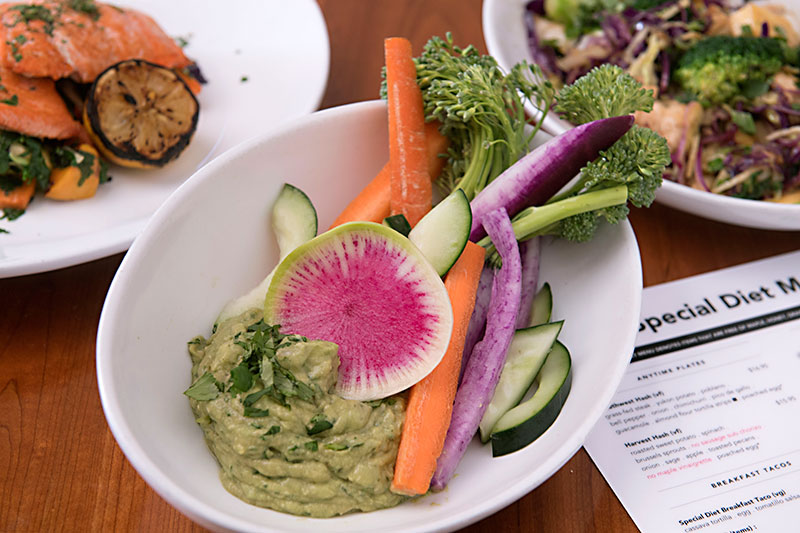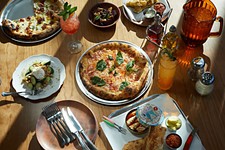It Takes a Village to Eat Safely With Food Allergies
Local restaurants adapt to the growing number of Americans with food allergies
By Melanie Haupt, Fri., Feb. 2, 2018
We were picking up a late dinner at Little Deli in Crestview on a Friday night, and just as I was about to pay for our salads and pizza, my daughter requested a chocolate chip cookie from the display next to the cash register. "Does it have any tree nuts?" I asked the cashier.
"Is it an allergy?" the cashier asked. "Because they have been in there next to the other cookies." She gestured to the peanut butter cookies and chocolate walnut cookies in the display. I was taken aback, not because of the way the cookies were stored, but because the cashier thought to ask about the potential risks to my daughter, who does indeed have a tree nut allergy. I added a little extra to the tip line on the credit slip that night out of appreciation for that stranger's consideration.
According to Food Allergy Research and Education (FARE), there are as many as 15 million people in the United States with food allergies; an estimated 5.9 million of those people are children. That means that 1 in 13 kids has a life-threatening allergy to something as mundane as a chocolate chip cookie or a peanut butter sandwich.
According to the Centers for Disease Control and Prevention, food allergies are on the rise, increasing by 50% from 1997 to 2011. The eight biggest culprits are milk, eggs, peanuts, shellfish, tree nuts, wheat, soy, and fish. Adverse reactions to these foods range from tingling in the mouth to hives to anaphylaxis, a dangerous narrowing of the airways that could lead to death. There are lots of theories about why so many more people are allergic to so many foods. Some researchers posit a "hygiene hypothesis" that Western culture is, basically, too clean and that a lack of early exposure to germs and dirt suppresses the immune system and increases one's chances of developing allergies and asthma. Another theory suggests that overreliance on antibiotics and antacids can alter the gut biome, triggering potential allergic reactions. Within the field of epigenetics, researchers are looking at how gene expression informs people's food intolerances. Whatever the causes, though, food allergies mean that without constant vigilance, the next meal could be one's last.
For some folks, though, food allergies are only a farce, or just another example of unfounded sensitivity from the same people obsessed with trigger warnings, feminism, and global climate change. At a 2016 campaign stump speech, Texas Senator Ted Cruz said, "The last thing any commander should need to worry about is the grades he is getting from some plush-bottomed Pentagon bureaucrat for political correctness or social experiments – or providing gluten-free MREs," rhetorically equating political correctness and unfitness to serve in the military with celiac disease or other conditions necessitating gluten avoidance.
Similarly, a recent Party City ad hooked to the Super Bowl stoked outrage when it referred to people who eat gluten-free as "gross." The party supply company yanked the ad and apologized. A mom friend told me about an incident in which, when trying to ascertain whether the chicken strips at a dine-in movie theatre were cooked in oil that was safe for her child to eat, she overheard a staff member snark, "If you have so many food allergies, why don't you just stay home?"
But even though the stakes for sufferers are real – and often life or death – people shouldn't be afraid to leave their houses for fear of accidentally eating a peanut or being ostracized. Food allergies are a stasis point when it comes to civility and kindness in our society, which presents an opportunity for those in the hospitality industry to add texture and nuance to the term that defines their field.
When her son started kindergarten, Darcy Hamre made it her mission to educate the school community about her son's life-threatening peanut and tree nut allergy. In addition to working with the teachers and staff at the school and drawing up a sheet for substitute teachers explicitly identifying her son and the signs of anaphylaxis, she reached out to the families in his class.
"I wrote a letter that went home with the parents explaining that there was a kid with nut allergies and this is a chance to teach your kid about empathy and compassion and what it means to be part of a community and take care of each other," she says. Avoiding contamination and accidental ingestion of an allergen is just one concern when sending your allergic kid out into the world: FARE reports that one-third of children with food allergies have been bullied as a result of their condition. The problem is so severe that FARE launched a campaign to curtail food allergy-related bullying with the "It's Not a Joke" campaign. In Hamre's letter, families were asked to keep peanut butter at home, if at all possible, and the kids were taught that friendship includes keeping our friends safe from the things that could hurt them. (Even Austin ISD has slowly embraced allergen-friendly students; PB&J sandwiches have been replaced with SunButter & jelly, and users can filter the online menus for their campus according to allergens.)
That empathy can extend itself into menu accommodations at restaurants, which can be full of land mines for the allergic diner. Monica Riese, a former Chronicle staffer who was diagnosed with a shellfish allergy last year, recounts a recent visit to Uchi, where she encountered subtle-yet-generous lagniappe in the form of allergy accommodations. "When the waiter mentioned something to do with crab, I said 'Ah, no crab.' He then asked if I was allergic to shellfish. I didn't even have to volunteer it; he took the initiative to ask after I ruled out the dish he'd suggested."
Says Kaz Edwards, concept chef for Hai Hospitality, "We understand that it can be very difficult for someone with an allergy, mild or extreme, to go out and eat. ... We will do everything in our power to accommodate a person with allergies. From manipulating ingredients in dishes to working with the servers to design a special menu, we really try and not allow the allergy to affect their meal. On top of that, communication is key, and we make sure everyone that is handling the food is aware. We even go so far to keep notes in our system about our guests' allergies so the next time they come in we are already thinking about what we can do."
Edwards continues, "We are in the hospitality industry; guests come into our home and we want to make them feel welcome and taken care of. We understand that for some, eating out with an allergy can be more than difficult, it can be frustrating and daunting, and a lot of people just avoid it. We don't want anyone to feel that way in our restaurants. We want them to feel comfortable knowing that we will take care of them and give them a great experience. We cook a family meal for our staff every day and we have staff members with allergies that we have to be considerate of. Understanding, empathy, and communication are key in all aspects of what we do – from staff to guest, and the community at large."
Vivian Ballard, who along with her husband owns and operates the Fairview Austin – the only gluten-free B&B in Texas – makes it her business to accommodate special diets. She also scouts out restaurants in Austin that people with food sensitivities can safely dine at. "When it comes to anaphylaxis-type allergies, people will generally come already knowing how to ask those questions in restaurants, and I can send them to restaurants where I know you can have that kind of conversation where it gets from the server to the kitchen faithfully and where they take it seriously." Ballard compiles her findings on the Fairview's website; her recommendations include Vinaigrette, Thai Fresh, Fonda San Miguel, and Vespaio.
Over the course of researching this story, the same restaurant kept coming up in conversation: Picnik. Far from just the restaurant for paleo folks seeking their butter coffee fix, Picnik's ethos is one of inclusion for those who have to exclude things from their diet. Diners can rest assured that the menu at Picnik is gluten-, corn-, soy-, and peanut-free. Symbols on the menu denote any item that contains some of the other allergens, like eggs and nightshade.
For founder Naomi Seifter, who suffers from food allergies herself, communication is essential in dining out safely. "One of the things we ask our customers and that I would recommend is to tell your server or the restaurant of any allergies you have. If you communicate to them what your needs are and they care about your business, they will go out of their way to accommodate you."
It's that emphasis on inclusion rather than exclusion that makes the difference for families who both negotiate life with food allergies and don't want that allergy to define or circumscribe their lives. "As a food allergy parent, to have that reassurance that they don't use tree nuts or peanuts, we would go back a thousand times to avoid that watchfulness and stress," says Hamre. "I would pay the extra money for a chef to go out of the way to do that kind of stuff. If they treat us with compassion we will come back again and again."











